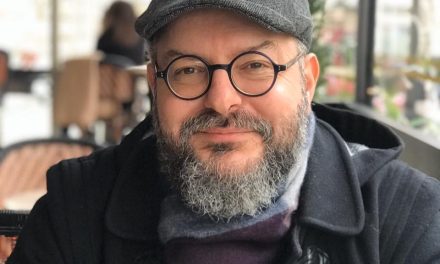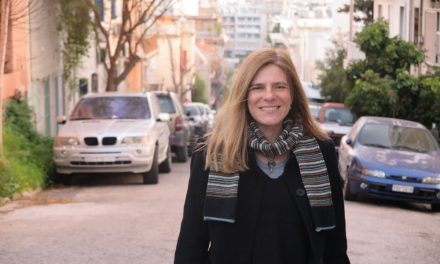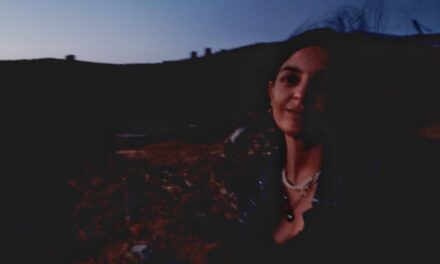Foivos Oikonomidis was born in 1997 in Athens. His debut novel North [Βορράς] (Hestia Publications, 2020) won the 2021 State Literary Award for Best Debuting Author. His poetry collection A Million Days Of Sleep [Ένα Εκατομμύριο Μέρες Ύπνος] in collaboration with visual artist Yorgos Kapsalakis, was published by Hestia in 2022. He studied Electrical Engineering at the National Technical University of Athens and Screenwriting at The London Film School. He works in the advertising and film industries as a screenwriter, and has a regular column in To Vima (Το Βήμα) newspaper.

Your latest writing venture Γιακαράντες [Jacarandas] (Estia, 2024) received quite favorable reviews upon publication. Tell us a few things about the book and its title.
Jacarandas is, at its surface, a story about Dimitris, a software engineer in his late twenties, who works at an evolved TikTok-like social media and suffers from an anxiety disorder. He tries to navigate his inner world and the actual modern world, both of which seem to be crumbling. Especially after it becomes evident that more and more people across the world keep falling ill to an inexplicable, absolute burnout, which no one seems to know what causes. At its core, it is a story about the things we do to distract ourselves from reality, which can be insufferable, and from the deep existential truths we can’t easily handle, like death and our fear of it.
Dimitris spends so much time lost inside himself, incessantly monologuing, trying to figure which way he came in to go out again. Doing what he can to avoid being incapacitated from the burnout like his flatmate is, he is forced to ask: is this what life is supposed to be? Is this the world we’ve been given? Is this job that I’m doing, and this screen that I’m holding, and this loneliness that I’m feeling, and this overarching chaos, is this it? And there really seems to be no easy answer. At one point in the story, he comes across this tree. He sits on a bench in the center of Athens with a friend, and this tourist passes by, and points at a tree behind them and shouts “Jacaranda!” (True story, by the way) Dimitris turns around, and looks at this beautiful tree with these radiant violet flowers, and his friend explains that this is what it’s called, the tree. It’s a jacaranda. But Dimitris’ friend is perplexed. This tourist, why did he get so excited? There might not be jacarandas everywhere in Athens, but there certainly are quite a few of them. “That idiot,” says the friend, “he comes all the way to Athens just to look for jacarandas”.
Jacarandas become vital to the protagonist’s way of thinking about life, when his mental state reaches boiling point. Athens is beautiful, but it’s not a stereotypically beautiful city. It can be quite ugly actually. Grey and stifling, there’s something dystopic about how urban it is. But there are jacarandas. Quite a few of them. And you have to search for them, if only to witness they’re there.
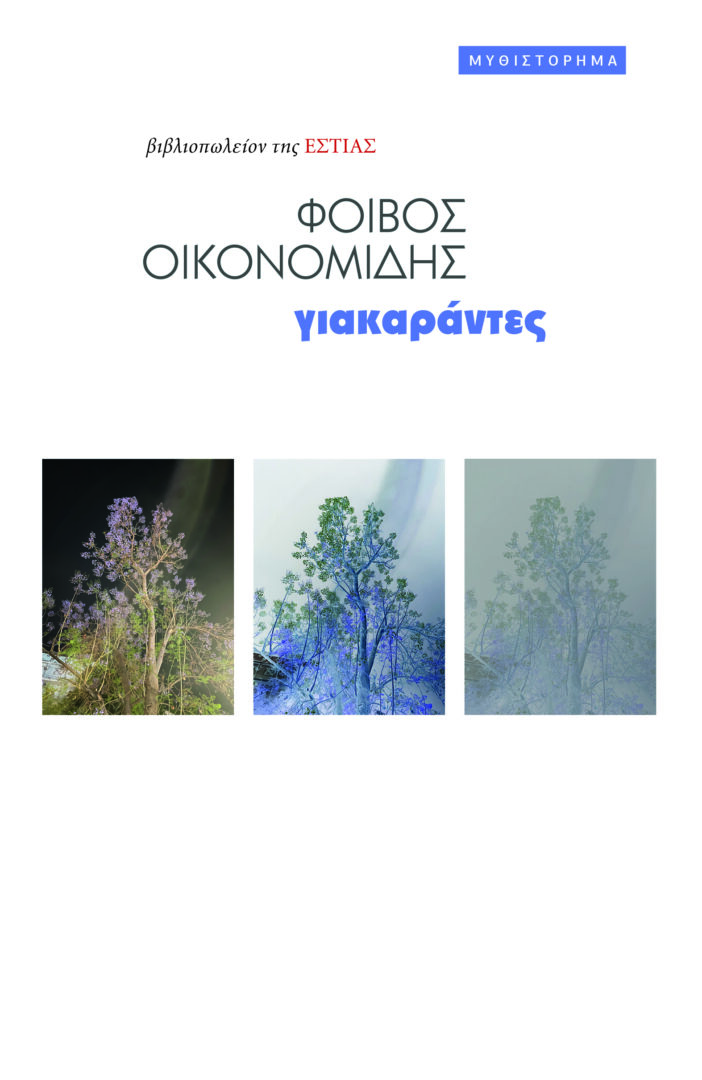
Written in the first person, the book describes a meta-world where people collapse from a burnout pandemic. How is literature used to describe its surrounding reality? Can it be used to describe what could be radically different realities?
I think literature is quite effective in the way it permeates the skin and allows for what’s inside to be revealed in minute detail. Through literature one can show how reality takes form inside them. How they perceive it, how they suffer or thrive in it, what their attempts to escape it look like. I think there is no world other than the one in our heads, and that we have a really tough time communicating our worlds to each other. So, literature is a great way to empathize. That is the way, I think, through which it can be revolutionary. When we talk of radically different realities, dystopias or utopias and what not, what we want to know is how it feels to live in such a reality. As long as we emphasize on the human experience, literature can describe anything.
“We are ready at any moment to break into a thousand pieces […] It is probably because the old world has been demolished and a new one has not yet been built and we are in between and have no idea what is happening to us…” Ηow do your writings describe this liminal era?
I do my best to be honest. I try to empathize with people that I come into contact with, see how they see things and why. There is a central question in anything I write, not one that I aim to answer, but one I aim to explore. Each character represents a different facet, another way of looking at said question or, perhaps, a way of answering it or failing to answering it. In Jacarandas we find characters who are lost, who can’t make sense of things, who reach out to grasp something to hold onto but find nothing sturdy there. I think it is because they find themselves in between, they are, as you say, in a liminal era. In ten years the world could be gone or it could be completely transformed. How do we keep going? When all else falls apart, what is sturdy and always there? These are vital questions, I think, in this time.
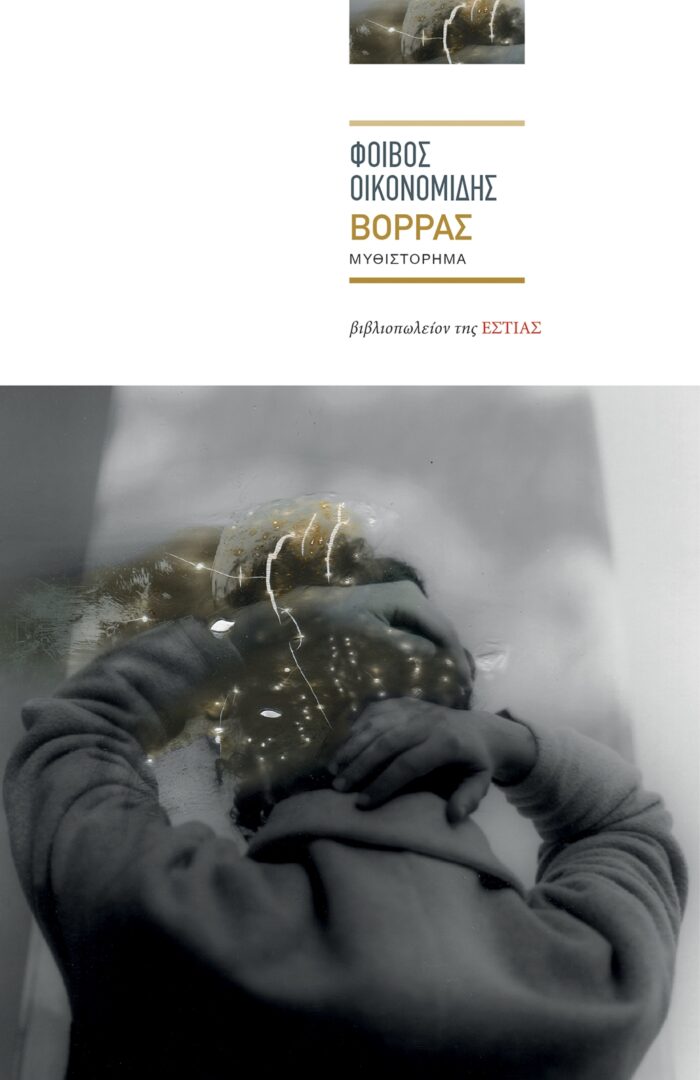
What about language? What role does language play in your work?
I try to write without being restricted by an obsessively literary language, if that makes sense. I see the narrator – be it a text in the first or the third person – as a character, which means they have their own tone of voice, same as every other character in a story. What’s important to me is that I create vivid images. Scenes that are visceral, almost in a cinematic way. When a character speaks, I want them to sound natural. I want them to say what a person like them would say in real life, and not something that feels plastic but reads well on paper. And when the story is narrated, especially if it’s through a character’s internal thoughts, like in Jacarandas, I want it to be immersive, by which to say I pay great attention to rhythm. When Dimitris’ thoughts are spiraling, I want it to feel like a downward spiral. Like an endless unraveling, comma, after comma, after comma, a repetition of words, like one who tries to stop from falling down a cliff but every piece of rock they grab breaks off.
In the era of online communication, how have reading and writing preferences changed? What role do the social media play in the promotion of new literary voices?
It feels like if a book isn’t a subject of discussion online, then it hasn’t really been published. But I think, now as ever, word of mouth is what matters for a book’s success. That includes the words of digital mouths. Bookstagram and BookTok can definitely help promote a book, but at the end of the day it’s up to the book’s qualities, and some books will always be more popular than others. For new writers, the sheer number of books being published make it extremely difficult to stand out. They self-advertise on social media, they post and post, but there’s an ocean of content out there and the same goes for book-related content. It’s like it is simultaneously the easiest and hardest time ever to be a writer.
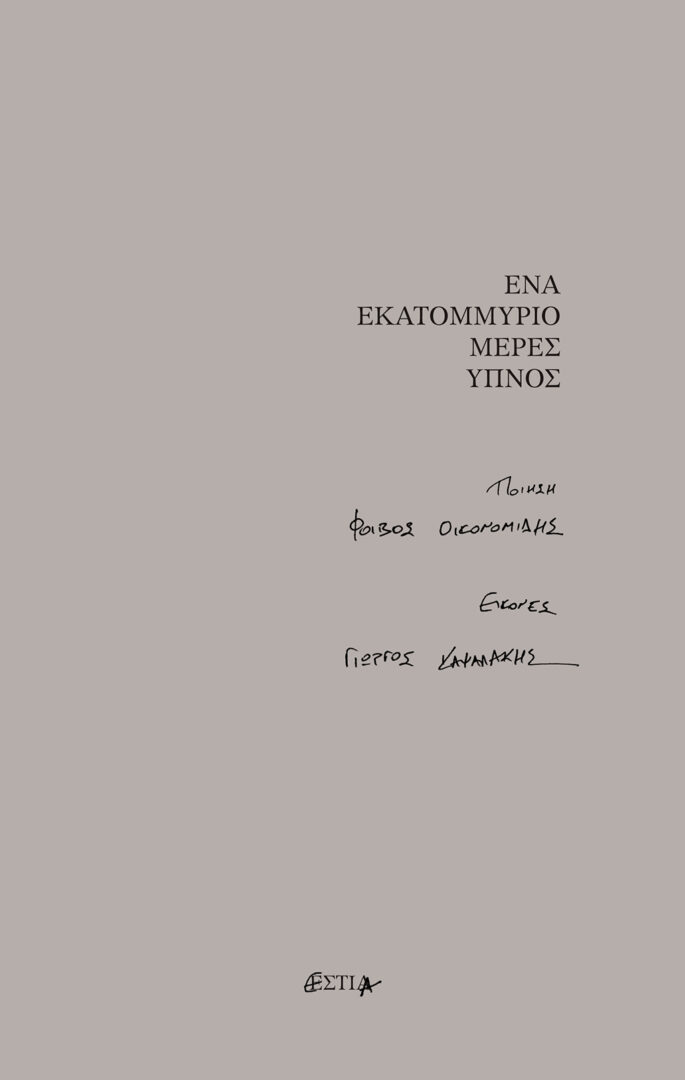
Ηοw do contemporary writers converse with global literary trends? Where does the local meet the universal?
There are constant, 24 hour live feeds updating you on any conflict anywhere on Earth. And that often feels like a curse, but it also makes for a quite wider sense of the world. And there’s also the fact that many of the problems we face today are far reaching, worldwide issues. Climate change, inequality, technology, escalating war. That is to say it’s not just the global literary trends we are even more aware of now than in the past, it’s like we’re sometimes also aware of a very similar experience of the world.
I do believe, however, that the way for universality is through the local. Local not necessarily as in the experience of your small town, but as in the attempt to describe something that feels intimately familiar and true to you. This surge in auto-fiction today may be, in part, driven by this feeling of everything, everywhere all at once being one and the same. You feel like you need to be very personal in order to express something new that’s also real. I think that’s interesting. I think what comes next will be even more so.
*Interview by Athina Rossoglou
TAGS: LITERATURE & BOOKS | READING GREECE

